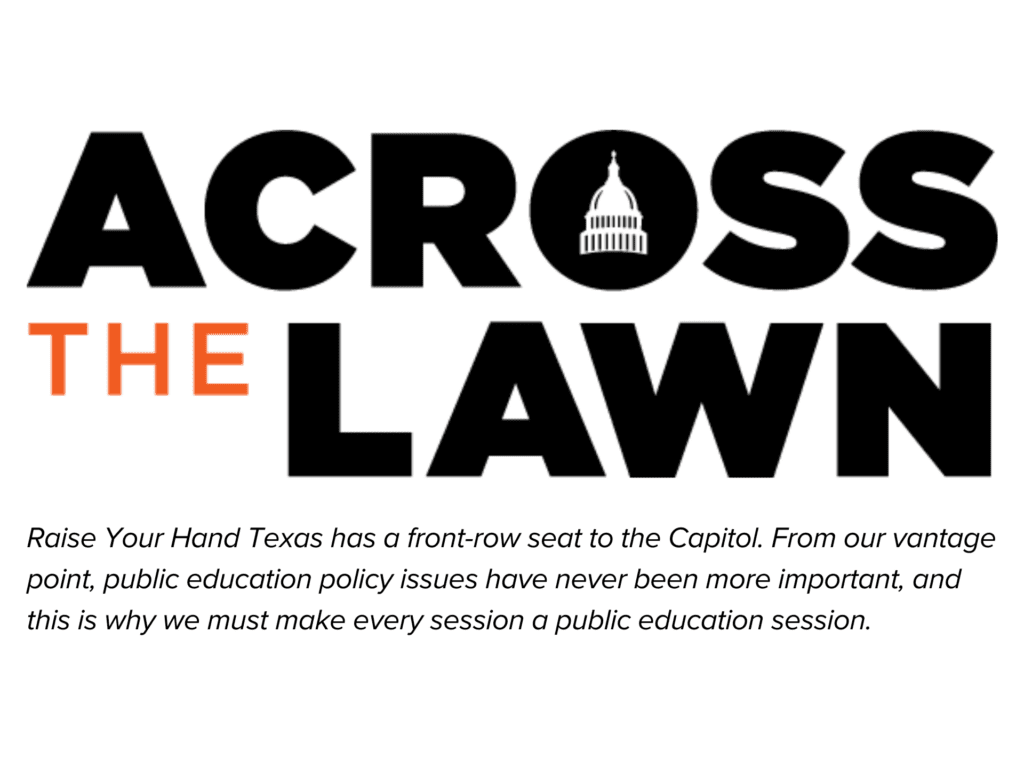
categories
Across the Lawn – August 29, 2025

August 29, 2025

ONE THING TO DO: Read The Texas Tribune’s article on STAAR
The recent changes to House Bill 8 have a direct and significant impact on how Texas schools are evaluated. The Texas Tribune has the full story on why one test on one day shouldn’t be the final word on student success. Read the article by Sneha Dey and Jaden Edison to understand what’s at stake and why this bill is so important to Texas’ future:
1. House Passes House Bill 8 on Assessment and Accountability, Sends to Senate
On Tuesday, August 26, the Texas House gave final approval to House Bill 8 (HB 8), the session’s major assessment and accountability measure, by a vote of 82–56. The bill makes changes to the state’s testing system by creating a new “through-year” assessment model and changing how lawsuits and rating challenges are handled.
A key amendment from Chairman Rep. Brad Buckley accelerated the timeline for integrating student academic growth into accountability ratings, extended timelines for rating challenges, refined testing requirements for students in special programs, and authorized new accountability studies. Lawmakers also adopted provisions to keep the current prohibition on kindergarten testing in place and to scale back testing to the federal minimum. A separate proposal to delay implementation and create a commission study did not advance.
Overview of HB 8 as Adopted by the House:
- Assessment Transition: By the 2027–28 school year, the STAAR program will transition to a new instructionally supportive assessment program branded as the “Student Success Tool.”
- Through-Year Assessments: Requires beginning (BOY)-, middle (MOY)-, and end-of-year tests in reading and math (grades 3–8) and makes BOY/MOY optional for Algebra I, Biology, and English I. Alternative norm-referenced assessments may be approved for use in place of BOY/MOY.
- Annual Growth Measure: A statewide annual student growth measure must be incorporated into accountability ratings by the 2029–30 school year.
- Performance Indicators Study: Texas Education Agency (TEA) must partner with a higher education institution to study new accountability measures (e.g., teacher quality, school climate, parent engagement, workforce readiness) and report findings by December 1, 2028.
- Reduced Testing to Federal Requirements: The bill eliminates the 8th-grade social studies exam and the English II end-of-course (EOC), leaving only federally required tests (math, reading, science, Algebra I, Biology, and English I).
- Scoring: TEA must return raw scores within two business days of completion and automatically rescore the writing portion of reading-language arts exams if a one-point change affects a student’s performance level.
- Test Substitutions: Students may use performance on SAT, ACT, PSAT, PreACT, AP, or IB exams in place of some state-required end-of-course exams (EOCs).
- Credential Alignment: Creates a mandatory statewide credential library and requires an updated list of eligible industry certifications tied to high-wage, high-demand occupations. Only “credentials of value” count toward accountability.
- Special Populations: Provides alternate assessments for students with significant cognitive disabilities and requires that the lowest performance level reflect a student’s developmental level. Also allows parents to request paper-format testing.
- Kindergarten Testing: Districts are not required to submit results from TEA-approved kindergarten literacy and math instruments to the agency. The tools must still be used locally for progress monitoring and parent reporting.
- Transparency: Requires TEA to publish, by September 1 each year, the number of questions on each STAAR test, the cut scores, and scale scores. TEA must also post the full testing calendar two years in advance.
2. Senate Passes HB 8, Restoring Certain Tests, Narrowing Scope of Indicators Report
On the night of Wednesday, August 27, the Texas Senate voted 21–5 to adopt HB 8, advancing school assessment and accountability legislation. During the very brief discussion on HB 8, Sen. Paul Bettencourt offered the only amendment, which includes:
- Restores testing from House version: Senate restores U.S. History and 8th-grade social studies tests. High school students will no longer be required to take the English II EOC exam. Required EOCs are now just Algebra I, Biology, English I, and U.S. History.
- Unclear Path for Annual Growth Measures: Instead of requiring the commissioner to automatically incorporate a new statewide student growth measure by 2029–30, the bill now requires a report by March 15, 2029, to state leaders, after review by the Accountability Advisory Committee.
- Performance Indicators Study Narrowed: The 2028 report on new accountability indicators remains in place, but the study’s scope was reduced: “educator quality” and “school climate” were removed from the list of possible indicators, leaving advanced coursework, student engagement, workforce development, and parental engagement.
With Senate passage, HB 8 now returns to the House, where members will decide whether to accept the Senate’s changes or request a conference committee to reconcile differences between the two versions.
3. Comptroller Proposes Rules for Education Savings Account Program
The Comptroller’s Office has proposed rules to launch the new Education Savings Account (ESA) program authorized by Senate Bill 2. The rules outline how families can apply, what counts as an eligible expense, how funds are distributed, and how providers or vendors may participate. They also set procedures for oversight, suspensions, and appeals.
A key definition in the proposal is “assessment instrument,” which means either taking one nationally norm-referenced test (not criterion-referenced as required for public school students), which compares a child’s performance to peers across the country, or a test that meets state standards. The Comptroller notes the rules carry no new fiscal impact beyond what the law requires, and the public has 30 days from August 22, 2025, to submit comments.
You may submit comments on the proposal to: Education Savings Account Program, Educational Opportunities and Investments Division, 111 E. 17th Street, Austin, Texas 78701, or to the email address: Esa.Rule.Comment@cpa.texas.gov.
4. Attorney General Directs Schools on Ten Commandments Law
Attorney General Ken Paxton has instructed Texas school districts to comply with Senate Bill 10, which requires the Ten Commandments to be displayed in every classroom beginning September 1, 2025. While schools are not required to purchase displays, they must accept and post any donated copies that meet the law’s requirements.
A federal court has temporarily blocked implementation for a group of districts involved in ongoing litigation, including Alamo Heights, North East, Austin, Cypress-Fairbanks, Lackland, Lake Travis, Fort Bend, Houston, Dripping Springs, Plano, and Northside ISDs. According to Attorney General Paxton’s press release, all other Texas districts must follow the law’s provisions once it takes effect.


